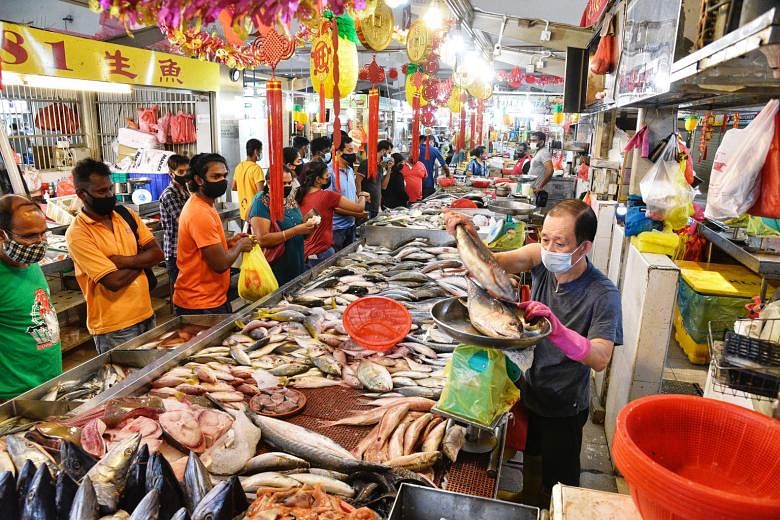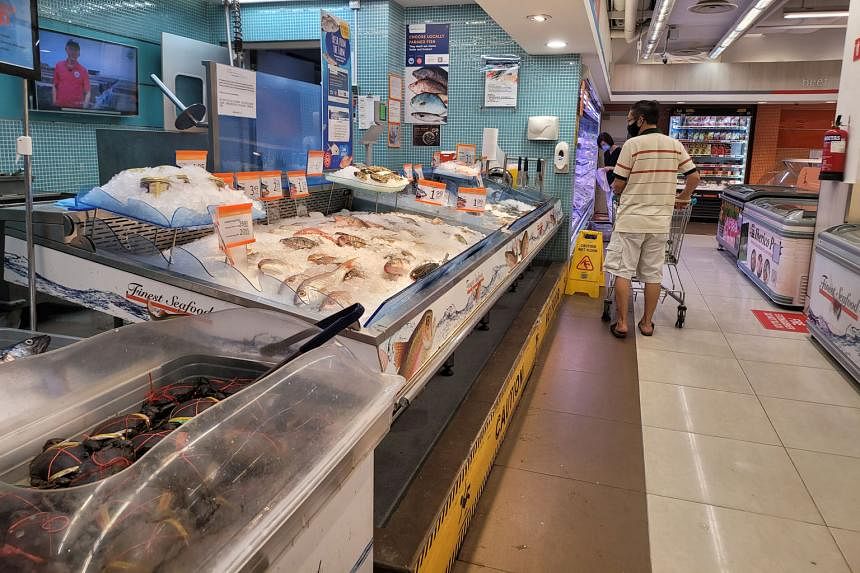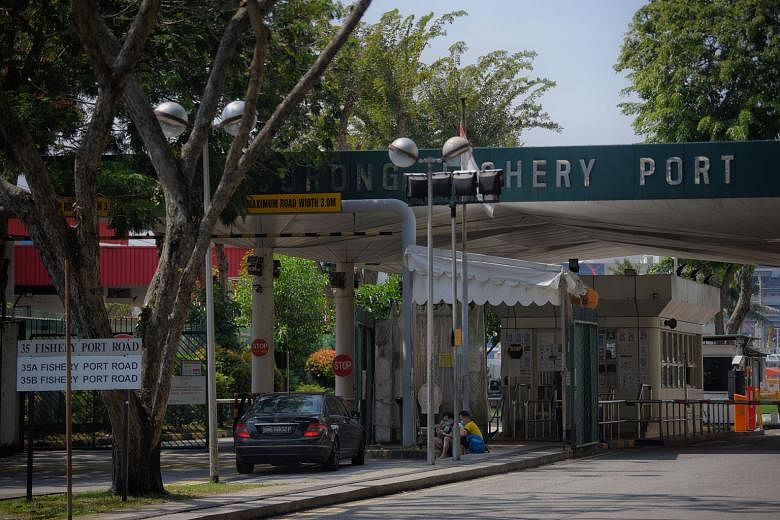The temporary closure of Jurong Fishery Port - a major distribution centre for fresh fish in Singapore - drove businesses large and small to scramble for alternative arrangements yesterday.
Meanwhile, consumers snapped up seafood amid growing concern over an impending shortage.
The rush meant long lines formed at wet markets and resulted in several stalls selling out early, with some suppliers announcing on social media they would not be accepting new orders.
The fishery port is closed until July 31 following the emergence of a Covid-19 cluster there. The cluster, linked initially to both the port and Hong Lim Market and Food Centre, currently stands at 19 cases, and has now been linked to 12 more markets and food centres.
Ms Rachel Chia, co-founder of seafood stall Guang's Fresh Mart, told The Sunday Times: "Generally speaking, if you sell fish in Singapore, you are affected by the closure."
Singapore has two fishery ports - Jurong in the south-west and Senoko in the north.
But last year, the authorities announced that Senoko Fishery Port would be closed by 2023 as patronage had fallen over the years. This meant that many suppliers had already moved their operations to Jurong, fishmongers told ST.
While Jurong Fishery Port boasts more than 100 merchants and attracts up to 3,000 customers daily, its counterpart at Senoko operates on a much smaller scale, with just 25 merchants and between 700 and 1,000 customers daily.
The larger port handles some 30 per cent of Singapore's seafood imports, including those that arrive by land and air, said the Singapore Food Agency (SFA).
Chilled fish make up around 60 per cent of its offerings, with chilled crustaceans and frozen fish accounting for another 20 per cent.
SFA yesterday said it was working closely with merchant associations and affected businesses to minimise the impact on Singapore's seafood supplies.
"For instance, arrangements are being made for seafood imports to be redirected to alternative premises," it said, urging consumers not to panic buy and rush to purchase seafood.
"While there may be temporary disruptions to the supply of chilled seafood, frozen seafood options remain available to mitigate the shortfall."
SFA added that Singapore imports food from more than 170 countries and regions.
To ensure the resilience of the country's food supply, SFA adopts a multi-pronged strategy including import diversification, growing overseas and local production.
SFA said consumers can play their part by being open to switching choices within and across food groups as well as different food sources.
Industry players - from supermarkets and seafood retailers to fishmongers and fish farmers - told ST the port's closure was affecting them.
Mr Crono Lee, director of Sunxion Seafood, said demand from individuals and businesses spiked yesterday, with some supermarkets and restaurants doubling or tripling their usual orders.
Although his store gets part of its supplies from the Jurong Fishery Port, it is also the retail arm of fish farm Apollo Aquaculture and Mr Lee is therefore not unduly worried.
He said: "Two weeks isn't a big issue. We have enough live fish available."
Other suppliers said they were working with the authorities to implement contingency plans for distribution, which will likely involve the smaller Senoko port.
Mr Daniel Pe, who chairs the Punggol Fish Merchants Association and is chief executive of seafood retailer Seafood Element, said the Jurong Fishery Port's closure will affect sea shipments but land and air imports will continue.
He said: "The issue now is to reorganise the distribution channels. In terms of scale and size, (Senoko) is definitely smaller.
"But at least it's another alternative to distribute seafood at the moment, to reduce disruption."
Chief executive of The Fish Farmer Malcolm Ong added that FairPrice, which is one of his customers, has set up a new distribution centre.
"We've been told to send our fish there," he said, adding that all supermarkets used to buy fish out of Jurong Fishery Port. "It's quite stressful and stability has worsened for all businesses."
A FairPrice spokesman told ST the supermarket chain was working with suppliers to explore alternatives and ramp up existing fish supplies.
"Fresh seafood currently remains available in our stores and we also have a wide range of frozen seafood to complement demand," the spokesman said.
The Dairy Farm Group, which operates supermarket chains Giant and Cold Storage, said that it was working with its diversified supplier base to increase existing supply. It will not be implementing purchase limits, although a group spokesman encouraged customers to buy only what they needed.
The spokesman said: "We remain committed to keeping the prices of our seafood stable as we understand these continue to be challenging times for everyone."
Long queues had formed at fish and seafood stalls at the Clementi 448 Market and Food Centre and Ghim Moh Road Market and Food Centre when ST visited them yesterday.
Stallholders were less sanguine about their prospects over the next two weeks.
Some, like Mr Koh Lim Poh, 47, said they would have to close during this period.
The fish stall sales assistant at the Clementi market usually closes at noon. Yesterday, he closed by 9am after his fish sold out.
"I feel disappointed this (the port closure) happened, but there's no choice and I can't help it," he lamented.
Mr Darius Nah, 26, who owns another fish stall at the market, said he relies solely on supplies from the affected port. "For the next two weeks, it'll be just like having a holiday - there'll be no fish to sell," he said.
Ms Chia of Guang's Fresh Mart, whose stall is at Geylang Serai market, added: "There were a lot of calls in the morning; everyone was very kancheong (Cantonese for overly anxious).
"Most of our customer base is Malay and this will impact the Hari Raya celebrations."



